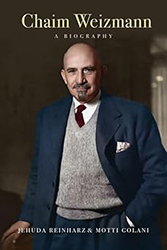Theodor Herzl (1860−1904) was an improbable leader of the Zionist movement. Son of a bourgeois family, at ease in the world of European culture, a prominent journalist and writer, Herzl could have comfortably fit into a life of literature and culture. But he unexpectedly turned to a different direction, galvanizing the nascent movement that led, decades after his death, to the creation of the state of Israel. In this compact, engrossing biography, Derek Penslar, professor of Jewish history at Harvard, seeks to explain how Herzl embodied these contrasting characteristics to become the inspirational leader of Zionism.
Penslar attributes Herzl’s success to his charisma — how he saw himself and how others experienced him. In the unsettled conditions of Jewish life in late nineteenth- and early twentieth-century Europe, Herzl offered hope, energy, and organization to the several small and scattered existing Zionist movements. Through his commanding presence and stately bearing — handsome, eloquent, with large and far-seeing dark eyes — he appeared to many as a prophetic figure. Against the opposition of assimilated Jews, socialists, and the Orthodox, Herzl managed to convene the first Zionist Congress in 1897 and was elected its president. Out of the congress came a structure consolidating the various Zionist groups into the Zionist Organization, and a program to establish a Jewish homeland in Palestine.
What caused an assimilated, accomplished journalist with little or no Jewish background to devote the last six years of his short life to the establishment of a Jewish homeland in Palestine? A deeply troubled man in an unhappy marriage, Herzl suffered marked mood swings throughout his life. As Penslar sees him, Herzl, racked by bouts of depression and insecurity, desperately needed a project to give his life meaning and into which he could throw his considerable energies. Through the knowledge Herzl gained as Paris correspondent for Die Neue Freie Presse, a prestigious European newspaper, during French political turmoil and financial scandals of the 1890s, and his reading in social theory, Herzl developed a vision of a model society that would alleviate the miseries of the working class, a vision he later incorporated into Zionism. With his geopolitical knowledge and standing as a journalist, Herzl positioned himself as the champion of a Jewish homeland and thrusted himself onto the world stage, negotiating meetings with European and Ottoman leaders and major financiers.
With extensive citations from Herzl’s diaries, correspondence, and journalistic and literary writing, Penslar conveys the complexities and ambition that made Herzl the voice of the inchoate longings of the Zionist movement. Although he died without achieving realization of his goals, Herzl is enshrined in Israeli history, his name on streets in almost every city and town and on Har Herzl, home to Yad Vashem and the resting place of many of Israel’s most celebrated leaders. Penslar gives life to Herzl’s dedication and lasting impact on Jewish history.
Maron L. Waxman, retired editorial director, special projects, at the American Museum of Natural History, was also an editorial director at HarperCollins and Book-of-the-Month Club.





